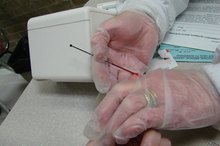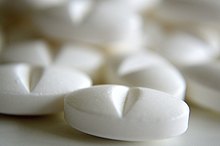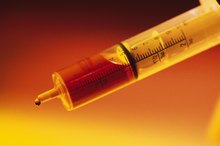What Prescription Drugs Can Elevate Your Liver Enzymes?
Medication-induced liver injury ranges from very mild to very severe. Doctors use blood tests that measure several different liver enzymes, along with other markers, to help detect injury from drug toxicity. Virtually any prescription medication has the capacity to cause liver enzymes to rise in a given individual, and not all elevations are persistent or worrisome. Prescribed medicines most commonly associated with liver injury and elevation of the transaminase enzymes, AST and ALT, include non-steroidal pain relievers, antibiotics, cholesterol-lowering statins, anti seizure medications, and drugs for tuberculosis 8.
If you are experiencing serious medical symptoms, seek emergency treatment immediately.
Acetaminophen
Acetaminophen (Tylenol) is a commonly used prescription pain reliever -- and an ingredient in a wide variety of products on drug store shelves 4. While acetaminophen is safe to use at recommended dosages, overdoses may result in liver damage that can unfold over 2 to 3 days 4. Sometimes, such liver damage is severe enough to be called acute liver failure. Acetaminophen toxicity is the number one cause of acute liver failure in the United States, and the liver enzymes AST and ALT are usually elevated in these cases 4. It is also important to be aware that liver toxicity from acetaminophen is especially prevalent when patients drink alcohol while using acetaminophen-containing medicines 4.
Statins
What Is a SGPT Blood Test?
Learn More
Cholesterol-lowering statins such as atorvastatin (Lipitor) -- can cause certain liver enzymes levels to spike (AFP ref; NEJM ref). While it is common for liver enzymes to go up mildly in people taking statins, the risk of liver from use is very low. Although rare, more elderly patients are more likely to have adverse liver reactions to statins as they are at higher risk for organ failure in general. If your physician is concerned with how your liver may respond to statins, they will likely test your liver enzymes before you begin statin therapy (Cur Cardio Rep).
- Cholesterol-lowering statins such as atorvastatin (Lipitor) -- can cause certain liver enzymes levels to spike (AFP ref; NEJM ref).
- While it is common for liver enzymes to go up mildly in people taking statins, the risk of liver from use is very low.
Antibiotics
Increases in liver enzymes are a common side effect of many different types of antibiotics such as amoxacillin, ciprofloxacin and erythromycin. However, it is difficult to predict which patients are most likely to have liver problems from antibiotic use, as many patients using antibiotics already have liver enzyme changes due to other conditions (J Ant Chem). If you are at risk for liver complications or have had liver problems in the past, your doctor may monitor your liver enzyme levels while you are taking antibiotics to make sure no liver complications come up during your treatment.
- Increases in liver enzymes are a common side effect of many different types of antibiotics such as amoxacillin, ciprofloxacin and erythromycin.
- However, it is difficult to predict which patients are most likely to have liver problems from antibiotic use, as many patients using antibiotics already have liver enzyme changes due to other conditions (J Ant Chem).
Other Prescription Drugs
Advil and Alcohol Effects on the Liver
Learn More
It is important to be aware while liver injury from prescription drug use is rare, the true incidence of liver damage from specific drugs is difficult to know, especially for drugs that are newer to the market. Anti-epileptic drugs such as carbamazepine (Seize article) and tuberculosis medicines such as Rifampin (Rifadin) (Eur Resp J) are commonly associated with changes in liver enzyme levels and liver function. Other common prescription drugs that can also increase liver enzyme levels include antidepressants and many antiviral drugs (NEJM).
- It is important to be aware while liver injury from prescription drug use is rare, the true incidence of liver damage from specific drugs is difficult to know, especially for drugs that are newer to the market.
- Anti-epileptic drugs such as carbamazepine (Seize article) and tuberculosis medicines such as Rifampin (Rifadin) (Eur Resp J) are commonly associated with changes in liver enzyme levels and liver function.
Following Up With Your Doctor
Whether you have known liver problems or not, it is important for you and your doctor to be aware of the potential risks to the liver from any medication. If you are starting a new medication, or, use a prescription medication on a long-term basis, it is good to be aware of the possibility of acute or chronic liver toxicity from any medicine. It is also important to recognize the signs of liver toxicity, including a yellowing of the skin known as jaundice, pain in the abdomen, loss of appetite and nausea.
Related Articles
References
- American Family Physician: Causes and Evaluation of Mildly Elevated Liver Transaminase Levels
- American Family Physician: Considerations for Safe Use of Statins: Liver Enzyme Abnormalities and Muscle Toxicity
- NIH LiverTox: Fluoxetine
- NIH LiverTox: Acetaminophen
- New England Journal of Medicine: Drug-Related Hepatotoxicity
- Journal of Antimicrobial Chemotherapy: Hepatic safety of antibiotics used in primary care
- NIH LiverTox: Estrogens and Oral Contraceptives
- Seizure: Antiepileptic drugs and liver disease
- European Respiratory Journal: Anti-tuberculosis medication and the liver: dangers and recommendations in management
- Cleveland Clinic. Cirrhosis of the Liver. Reviewed January 11, 2019.
- David S, Hamilton JP. Drug-induced Liver Injury. US Gastroenterol Hepatol Rev. 2010;6:73–80.
- American Liver Foundation. Medications.
- Cleveland Clinic Health Essentials. Is Acetaminophen Safe to Take When You're Drinking? Published December 19, 2017.
- University of Michigan, Michigan Medicine. Methyldopa. Revised September 17, 2018.
- Elsevier Science Direct. Hypervitaminosis A. Published 2015.
- National Center for Biotechnology Information, U.S. National Library of Medicine. LiverTox: Clinical and Research Information on Drug-Induced Liver Injury: Vitamin A. Updated December 3, 2013.
- National Center for Biotechnology Information, U.S. National Library of Medicine. LiverTox: Clinical and Research Information on Drug-Induced Liver Injury: Niacin. Updated February 2, 2014.
- Amathieu R, Levesque E, Merle JC, et al. Insuffisances hépatiques aiguës sévères d'origine toxique : prise en charge étiologique et symptomatique [Severe toxic acute liver failure: etiology and treatment]. Ann Fr Anesth Reanim. 2013;32(6):416–421. doi:10.1016/j.annfar.2013.03.004
- Devarbhavi H. An Update on Drug-induced Liver Injury. J Clin Exp Hepatol. 2012;2(3):247–259. doi:10.1016/j.jceh.2012.05.002
- Johns Hopkins Medicine. Drug-Induced Hepatitis.
Writer Bio
Karla Casco began writing in 2010, focusing her work on diseases and treatments and their side effects. She has also created patient handouts, PowerPoint presentations and journal clubs. Karla has a doctorate in pharmacy from St. John's University and holds a pharmacy license for the state of New York.









